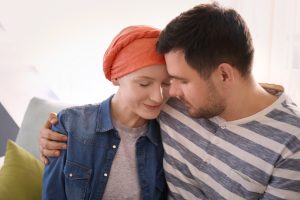Some words are heavier than others.
Words like ‘cancer,’ ‘surgery,’ or ‘coma.’ They are the words that make everything else blur into a haze. On my internal medicine rotation, one particular word shattered and shaped the rest of someone’s life.
Hospice.
It was just seven letters typed into a chart, but for her husband, it wasn’t just a word. It was a verdict. A death sentence. A thief who snatched away any remaining hope without his permission. His voice erupted down the hospital hallway as we made our way through rounds. His grief was so raw and his anger so fierce that the walls seemed to shake.
His wife was only 53, locked in a losing battle with metastatic pancreatic cancer. After four weeks of procedures, we were running out of options. The interventional radiology team had placed several internal-external biliary drains, our last effort to control the cancer. Days later, she went into septic shock. With her oncologist on board, the team recommended hospice.
“How dare you give up on her? How dare you write that in her note? Now no one else will try,” he shouted. The air thickened.
“When did medicine start abandoning people when things get hard?” For some, especially those who grew up believing medicine must always fight, the idea of comfort care feels synonymous with surrender. This perspective isn’t uncommon. For decades, the medical profession’s focus has been on prolonging life at all costs. However, conversations about end-of-life care have shifted. Prioritization of dignity and comfort over futile intervention has become increasingly seen as a form of compassionate, patient-centered care.
“We will come by shortly and talk in private,” the physician said calmly. But the husband wasn’t ready. He stormed away, consumed by anguish.
Later that day, I found him sitting by her as she slept, peeling the skin off his knuckles. I pulled up a seat next to him.
“Can you tell me about her?” I asked.
He sighed, his face softening. “She’s my best friend. We met in college, and I knew right away I never wanted to let her go. She’s hilarious, and she makes this cute squeaky sound at the end of her laugh. She’s ridiculously smart and so curious about the world. She loves photography, especially of plants.” His voice broke.

“I don’t know who I am without her,” he said tearfully. “She’s my best friend.”
I nodded. “She sounds wonderful. I can’t begin to imagine how you’re feeling.”
I visited him daily. Once after morning rounds, and again in the afternoon. Some days he wanted to ask exactly what a ‘bilirubin’ was, others were him showing me photos to relive a memory. I listened without steering the conversations. Slowly, he began asking more about hospice, though he’d always add, “I’m just asking. That’s all.”
When the palliative care team arrived, they took the time to meet him and explain their role. They spoke about comfort, about dignity, about how hospice didn’t mean giving up, but choosing how she would spend her remaining time. They answered his questions and addressed his fears. Some days he stormed out, others he lingered a little longer to hear them. Their patience reminded me that professionalism doesn’t demand immediate agreement but allows space for uncertainty. Over time, his uncertainty stopped consuming him.
When he began to listen instead of walking away, I felt his grief change from anger, to fear, to something that resembled trust and acceptance. It was no longer the team versus him. He saw that we were on the same side.
I will never forget the anger in his voice that morning. In that moment, the mechanisms of disease and memorizing treatment protocols no longer mattered. I used to think professionalism was about knowing the answers. But I now understand it’s just as much about standing with patients and their loved ones in their darkest moments. It is about being steady in the storm of others’ pain. It is about having the courage to hold someone’s suffering alongside them.
Some things, as doctors, we cannot fix. But trust is an exception. It is earned by remaining present, even when the bridge gets shaky. As a student, I didn’t need to make any grand gestures. I simply needed to stay.
We can ask, “Can you tell me about her?” And then, we can listen. Because while some words are heavier than others, trust has a weight of its own that can be powerful enough to help carry people through.
Rana Barghout is a third-year medical student at Weill Cornell Medicine. She earned her bachelor’s degree in neuroscience from Amherst College. She is passionate about improving care for vulnerable populations and advancing health equity. In her free time, she enjoys stand-up comedy shows, escape rooms, and exploring New York City.

